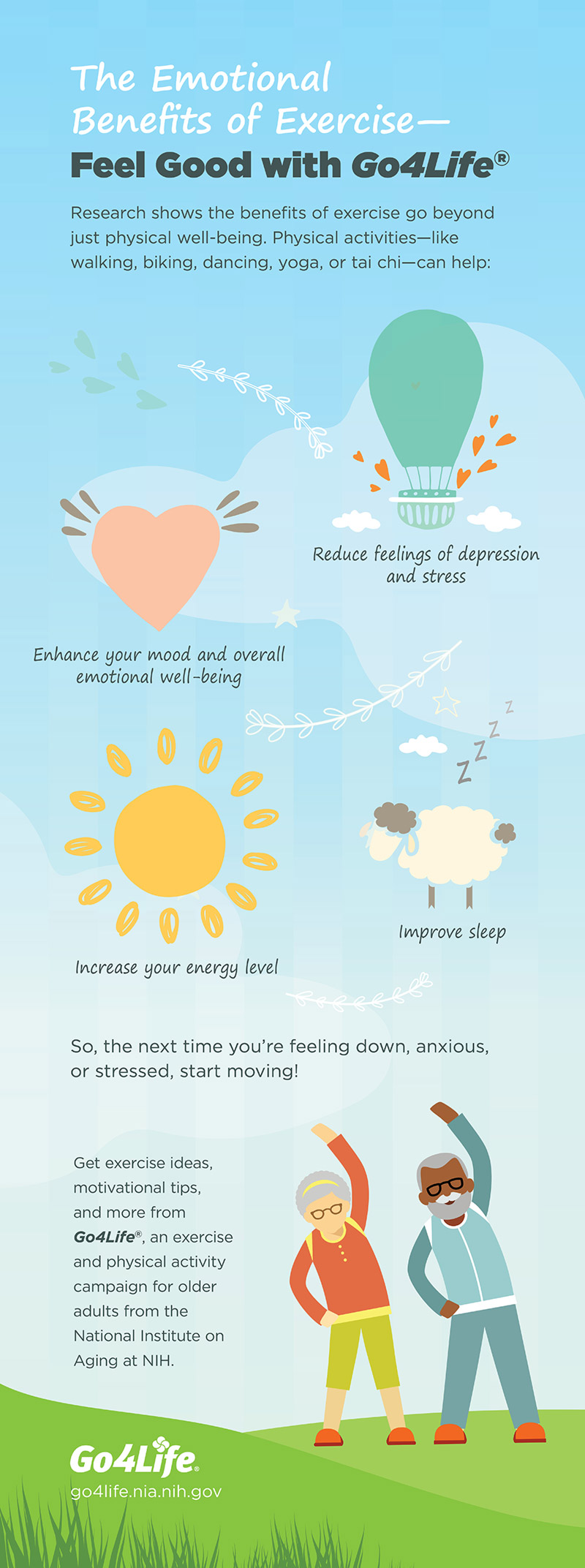Actions for emotional wellness
There are so many "upsides" of achieving emotional wellness. Being happy, at peace, joyful, positive, having higher self-esteem, and enjoying deeper relationships are just a few of these benefits. There are several ways to improve and reaching potential in the emotional dimension of wellness. These include:
Education
Help your people learn how to recognize triggers, causes, and symptoms of stress, depression, and the importance of good mental health. Focus your education on ways to work on and achieve positive emotions and feelings through wellness activities. Explain ways to modify diet, exercise, attitude, and to focus on positive thinking continually. Be sure to explain ways to find and experience joy and happiness in their lives. Help them change their perspective and include activities that elicit joy to help strengthen their mind and spirit. Remind people to practice gratitude and help others stay positive.
Social connections
Urge residents and staff to find ways to connect with others in meaningful ways using the new "social distance" norm-6 feet or using technology, including the phone. Create easy ways for them to socially connect, share thoughts and emotions, and engage in meaningful conversations. Create opportunities for people to use technology to reach out to loved ones and friends. Mandated isolation does not have to be a barrier that you cannot find ways to overcome.
Physical activity
The benefits of exercise to our emotional wellness are numerous.29,30 Researchers found that exercise is more important to your mental health than your financial status. Physical activities that involve socializing have a profound effect on mental health and emotional wellness. People who kept more active and exercised regularly, especially with others, tend to be happier overall.
Here is a resource that shows the emotional benefits of exercise that you may want to use for your customers:

Mindfulness meditation
Mindfulness meditation is a way to practice emotional wellness. Mindfulness meditation has a positive effect on symptoms of stress, such as lowering blood pressure, reducing pain, and decreasing anxiety and depression.37,38 Mindfulness is a practical method to create a relaxation response and to find focus, calm, and joy in everyday living. It is a type of meditation that directs racing thoughts and turbulent emotions to those of positivity. Mindfulness is an awareness that comes from leading our thoughts and attention to a purpose. Participation in mindfulness meditation programs can make measurable changes in the brain.37 These changes include increased memory, regulation of emotions, a better sense of self, improved empathy, and reduced stress.37,38
For more information, read The ICAA Journal of Active Aging article, "Making the mind matter." JAA July August 2017: page 24-28.
Changing thought patterns
Reframing your mindset starts with self-reflection. Why do I think this way? The way you frame your mind determines the way you interpret the things that are occurring around you or happen to you. Negative self-talk and pessimistic thinking is learned and can become a repetitive habit. Research consistently links pessimistic thinking to an increased risk of mental, physical, and social (relationship) problems. This thinking can create destructive attitudes that impact emotional wellness.
Help people learn to identify unproductive thoughts and modify their negative feelings. Especially during this time, get people to become aware of their thoughts moving toward the negative and producing stress and depression. There are several techniques to help change the way we feel by changing the way we think. Positive self-affirmations and gratitude sharing can help, but they only operate at the surface of the subconscious mind, and they are a difficult habit to maintain. One proven technique, called cognitive restructuring, focuses on teaching several effective practices.40 They include:
- Get organized mentally by making lists and organize space.
- Slow down thinking to have fewer thoughts that lead to negative thinking.
- Become more aware of negative thoughts and emotional reactions that tend to occur automatically.
- Break bad mental habits and replacing them with positive, healthful ones.
- Learn to be happy.
Archer, S. (November/December 2018). Happiness and health, part two: What you can do to boost happiness. The Journal of Active Aging, November/December 2018: p 40-47.
Sleep
Sleep is essential for our health and well-being, but often during a challenging time like we are in now, we do not get enough sleep. Sleep restores the mind and body. Stress causes the body and mind to be hyper-aroused, causing problems with sleep. Stress can make it difficult to fall asleep, stay asleep, and affects the quality of sleep. The inability to fall into a deep sleep can affect physical and mental processes, including memory. Sleep deprivation weakens the immune system and increases the risk of developing obesity, diabetes, and hypertension.43 So, if stress leads to sleep problems and sleep problems lead to health issues, you must emphasize to residents and staff that they need to get good sleep. It is critical for wellness.
Outdoors/plants
Getting outdoors, being in an environment surrounded by plants, or even looking at the outdoors, or a beautiful landscape lifts our spirits and calms our inner stress. Find ways to expose your customers to the beauty of nature; it proves to strengthen our emotional well-being.
Stop and think. Do you have sleep education as part of your wellness program? Do you teach your customers ways to achieve the best quality of sleep? Do your customers understand that the lack of sleep can affect physical and cognitive function?
Conclusion
Developing emotional wellness is an integral part of an overall wellness plan. Emotionally well people understand and control their thoughts, feelings, and behaviors. They keep problems in perspective, can bounce back from setbacks, and can cope with life's challenges. During the COVID-19 pandemic, Wellness professionals must devise education programs and wellness initiatives to support the emotional wellness of their communities.
Share






























